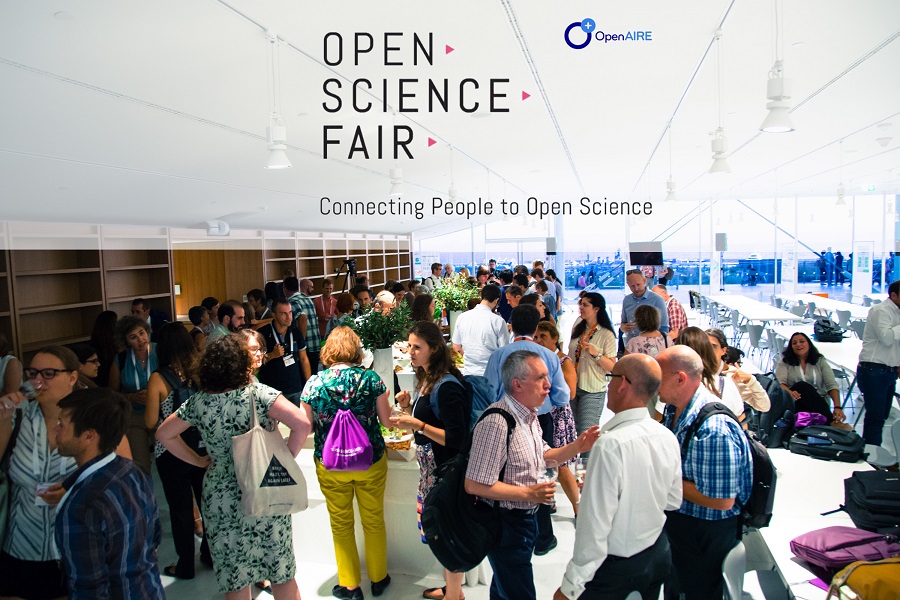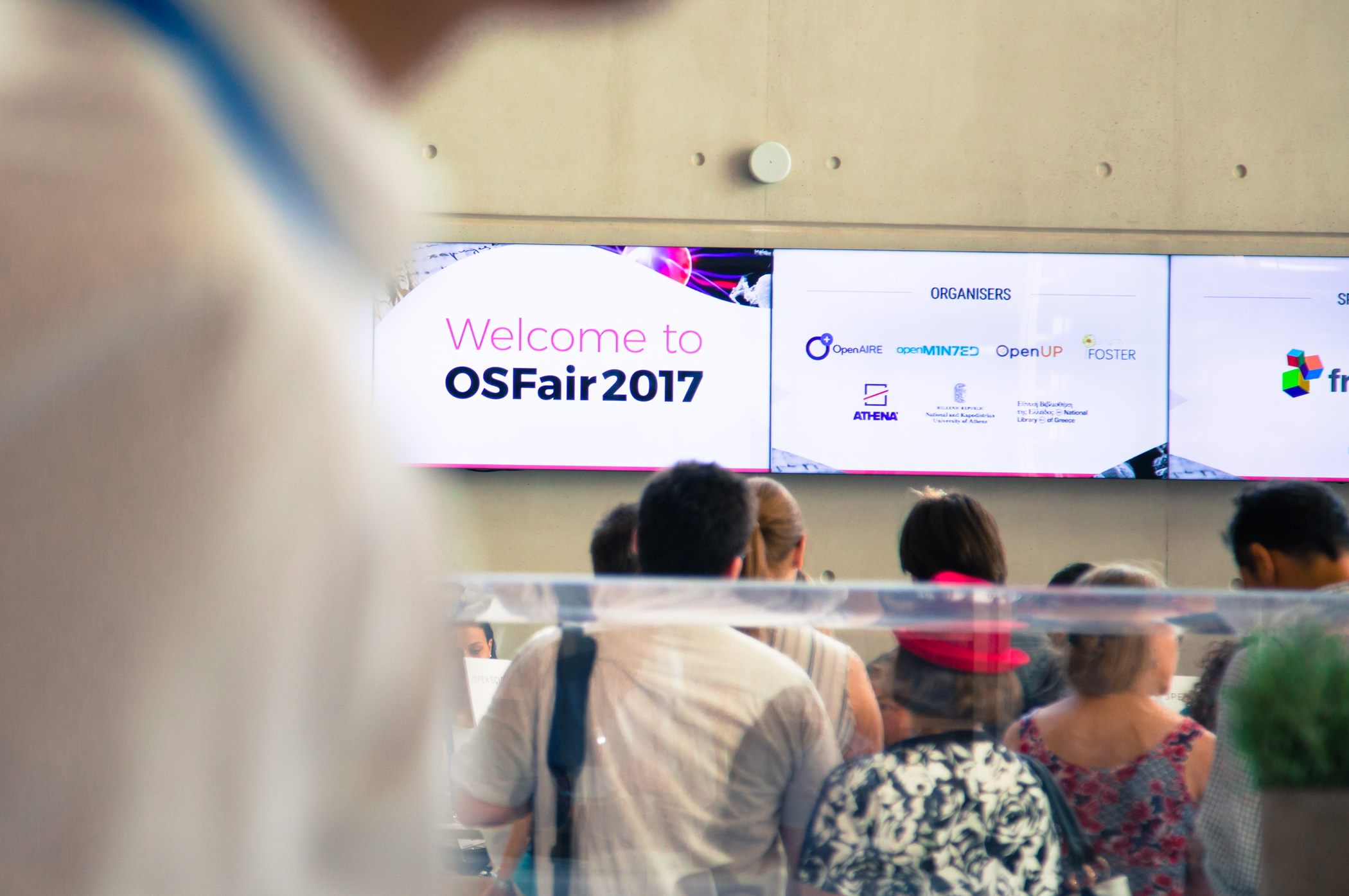Open Science FAIR 2017
In early September, over 300 delegates gathered for the inaugural Open Science Fair in the impressive new building of the National Library of Greece. The organisational efforts of four EC funded projects, the three-day Fair brought together a wide-range of experts on open science, open access to discuss and train in equal measures.
Two inspiring keynotes from Jeffrey Sachs and John P. A. Ioannidιs set the context: that science is crucial for the good of mankind and making it reproducible and open even more crucial. Other international speakers covered gender, diversity and new methods in the publication research life-cycle. All this was complemented by a tight schedule of workshops covering all elements of open scholarship. All in all the flair of the Fair wasn't be missed!
Katarina Svitkova wrote a blogpost about the OS FAIR which goes into more details about some of the presentations and keynote speakers.
You can Watch the Film Open Science Fair 2017 from OpenAIRE on Vimeo.
Sant-Geronikolou Stavroula wrote a report on the OS FAIR. An extract of the report follows. 
The Open Science Fair, an initiative of OpenAIRE, OpenMinTeD, OpenUP and FOSTER, brought together an international audience with the aim to provide and enabling the research community and librarians among other stakeholders to enjoy a comprehensive 360° view of current international field dynamics deployed around three major axes- OS policies and processes, OS impact and FAIR data and Services- and a thorough initiation to short and long-term visions of what is coming next and what, according to OS leading experts the next top priorities should be in order to speed up the transition to OS from all different stakeholder perspectives.
While opening and keynote presentations were the pacemakers of the event highlighting challenges and benefits associated with the scholarly communication and research dissemination paradigm shift stressing the importance of continuous methodological education and all stakeholders’ interests alignment the way to resolving the current scenario ambivalence, parallel sessions and workshops offered an OS emerging framework outline and additionally a hands-on approach to:
- Evaluating OS drivers importance from researchers standpoint
- Testing the Knowledge maps interface and potential
- Becoming familiar with the OpenUp Hub innovative dissemination toolbox properties
- Critically analyzing the FAIR principles web-based assessment tool’s effectiveness and adequacy
More specifically, presenters stressed the importance of communication and coordinated efforts ( Tennant), transparency in terms of OA funding and costs along with the need to get out of the box to see how OA relates to the community (Manola), train data scientists, establish adequate reward systems (Tavernarakis), move away from present indicators, flawed metrics of JIF and related measures (Matthias, Markie), promote the engineering spirit (Sachs), support advocacy and exchange opportunities and establish a transparent social network over repositories (Knoth) in order to overcome legal, political, economic, organizational, technical, sociocultural, informational related OS barriers that lead to inertia (Tennant), challenges associated with publication and research data sharing culture diversity, discipline specific infrastructural availability, the degree of publishers’ support of self-archiving policies and publishers’ compliance with funders’ OA requirements (Tavernarakis), bonds and interrelations between society and publishing status quo that have to be tackled in order to move forward [Markie], the difficulty to inspiring the community and to redirect some of the library funds to support OA (Shearer), and science falsification, reproducibility (J. P.A. Ioannidis) and copyright considerations (Giannakopoulou) in their fight against skepticism surrounding OA publications and scientists’ fear of the possibility that their work could be under-evaluated or compromised.

During plenaries and selected parallel sessions, we had the opportunity to attend OS experts addressing a set of critical questions around
- Inefficiencies of existing publishing system [Shearer, Fecher]
- Reasons for launching OS institutional platforms [Fecher]
- Open reviewer quality and conflicts of interests issues potentially involved in the open peer review process [Fenter]
- Ways to balance Open Access with incentives
- The confusion surrounding Europe’s existing growth model [Sachs]
- Building momentum around incentivizing community to adopt the new standards [Shearer]
- Policies and mandates adequacy to really helping overcome OS barriers [Tennant]
- People’s fear OS could compromise their career
- Ways Altmetrics could feed back into science [Gauch]
- Media impact on the value system of science [Gauch]
- New Generation Repository (NGR) characteristics [Knoth]
Making the case for Open Peer Review and Open Publishing Platforms and proposing practical solutions:
- The Communalist approach to the infrastructural issue where public infrastructures are highlighted as the solution to the realization of the Journal Flipping Model that will serve the public while managed by academics.[Fecher]
- OA views and downloads mapping to feed the conversation as to where the most vibrant open access hubs and supporters are located
- Continuous methodological Education (CME) for catching up with methods and tools as a solution to OS blockers [JPA Ioannidis]
- Nanopublications in LOD [Penev]
- The Journal Flipping Model managed by academics through a public infrastructure [Fecher]
- Going beyond metadata in a combination of activity and descriptive data that enables bulk data transfer, navigation and notifications
along with offering a quick overview of OS community long-term visions of repositioning the institution and the library at the center of scholarly communications, making libraries operate as open trusted durable interdisciplinary, interoperable content platforms (Shearer), bringing repositories back to the central of the research community and closer to the researcher (Rodrigues), adopting extended functionalities within repositories (Shearer), making researchers embrace the new paradigm and finally creating an Open Research Central platform where platforms will be merging across space and disciplines (Markie).
To that direction, national and international institutions and organizations in their effort to improve the virtual research environment to support collaboration and knowledge sharing (Bossy) have been engaged over the past few years in prioritizing and promoting the OA/OS case by forming interdisciplinary OA working groups (ERC), organizing surveys and workshops aiming to raising awareness of the importance of research dissemination to non-academic audiences, developing Innovative Dissemination Tool boxes (OpenUp Hub), semantic text data mining (LitPath Explorer) and topic modelling services (OpenAIRE), Taxonomies, OS license matrices and research data assessment tools (DANS FAIR), global scientific output search optimization platforms (Linknovate), expertise directories, Open textbook networks and finally instituting Open Science Award Scheme to promote OA/OS practices among researchers (University of California, Berkeley)
Key Takeaways
- There is already a lot of consolidation around these issues [Shearer]
- There is an avant-garde of researchers using innovative dissemination channels with great success marking a European predominance [Kraker]
- There is a shift of focus or emphasis towards OS evaluation models, namely open peer review, OS impact metrics
- As OS /OA gain momentum and OS platforms flourish, we are urged to respond to a new set of questions critical to researchers and OS supporters’ engagement and participation.
- Bridging knowledge with open source semantic text mining infrastructure is important to overcome silos and information fragmentation
- Open and sustainable TDM platforms can facilitate the leap from OA to OS
- Interoperability is a growing demand [Knoth]
- Changing practices for science methods, results and inferences reproducibility are underway.
This is an extract of the OS FAIR report written by Sant-Geronikolou Stavroula. (2017, September 12). 1st Open Science Fair Report. Zenodo. http://doi.org/10.5281/zenodo.889802
If you want to read more about the conference and watch video's of OpenAIRE NOADs on how OpenAIRE does effectively help them, you can check out the following links:
- Biljana Kosanovic (University of Belgrade) describes how OpenAIRE helped Serbian institutions in creating their network of institutional repositories: https://vimeo.com/233330015
- Mojca Kotar (University of Ljubljana) explains how Slovenia developed the National OA Strategy and Action plan, and how OpenAIRE can help institutions and research performing organisation in Open Science policy creation and stay update on Open Research Data: https://vimeo.com/233290232
- Kevin J. Ellul (University of Malta) speaks about the need for alignment with other countries to develop Open Science policies and also about how OpenAIRE helps NOADs in liaising with stakeholders (from researchers to policy makers): https://vimeo.com/233289541
- Just De Leeuwe (TU Delft) tells us about the national plan for Open Science in The Netherlands and how OpenAIRE can help giving proper information on the EU open science policies so that encouraging countries to align to them: https://vimeo.com/233289449
- Jessica Rex (University of Konstanz) tells us that one of the challenges of Open Science is related to publication costs. OpenAIRE helps institutions and researchers to cope with this issue with the post-grant Gold Open Access fund, and provides NOADs with all the information needed to make researchers' communities aware of these possibilities: https://vimeo.com/233289382
- Jadranka Stojanovski (Ruđer Bošcović Institute) tells us why Open Science is particularly important to small research communities, and how OpenAIRE empowers and supports them in creating a culture of openness: https://vimeo.com/233289362
- Gultekin Gurdal (Izmir Institute of Technology) describes how OpenAIRE is helping Turkey in finding the way towards a common policy on Open Science and Open Access: https://vimeo.com/233289304
- Camilla Smith (National Library of Sweden) confirms that OpenAIRE guidelines are a valuable and useful tool to liaise with researchers and funders to raise awareness about Open Access and Open Science: https://vimeo.com/233289290
- Asger Væring Larsen (University of South Denmark) explains what are the challenges of Open Science and how OpenAIRE can help institutions to reach out to researchers: https://vimeo.com/233289232
open access, horizon 2020, open data, open peer review
